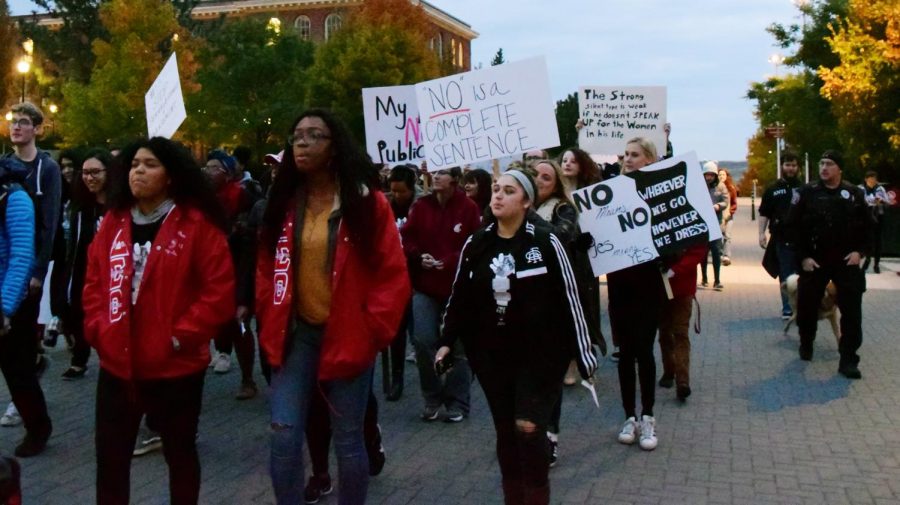Men must play role in ending sexual assault
Sexual assault is a problem created primarily by men, therefore it is up to men to stand up to it
JORDAN MAXWELL | The Daily Evergreen
Survivors of sexual assault and domestic violence and supporters march past Bryan Hall, chanting “Silence is not consent” during the Take Back the Night march Thursday evening.
October 25, 2017
Take Back the Night, the annual march to raise awareness for sexual assault and domestic violence, which took place last Thursday, blatantly lacked an important component: men. Sure, there were a few men in the crowd, but the large majority of protesters were women.
Sexual assault cannot be stopped if it is pushed aside as merely a women’s issue. Sexual assault and rape culture is a men’s issue.
More than 90 percent of perpetrators are men, according to the National Intimate Partner and Sexual Violence Survey. According to the Rape, Abuse and Incest National Network, 90 percent of adult survivors are women. If we as a society are serious about stopping this epidemic, men need to show up and not only support protests and marches like Take Back the Night, but they need to integrate awareness into their everyday lives.
Sarah Sherrod, secretary of YWCA at WSU, said a great way for men to combat sexual assault is to speak to each other.
“I would like to see men calling out other men and taking responsibility for their male counterparts,” Sherrod said. “I’d also just like to see more support for women and others who are fighting for these same issues.”
This means it is important for men to shut down rape jokes. It means men must recognize the complacency they have with a system that puts women into a state of fear just for walking alone at night.
This is what Take Back the Night was all about and is what Amy Sharp, director of WSU’s Women’s Resource Center, thinks men can help change. Sharp mentioned a story of a woman being sexually assaulted after stepping out for a cigarette at three in the morning. Sharp said her boyfriend at the time pointed out that women shouldn’t have to live in a world where they fear going outside, even if it’s in the middle of the night.
“She should be able to smoke a cigarette at three in the morning and not have to worry about her safety,” Sharp said. “That should not be something that every woman has to consider if she wants to go out and smoke, or if she wants to get some fresh air, or hell, if she wants to go running at three in the morning. That should not be something that she has to always consider.”
Rape culture is not just about the physical act, but is instead a result of how our society treats women. Next time you’re in class or hanging out with friends, recognize how often men interrupt or speak over women. When you hear someone talk about sexual assault, recognize how often it is blamed on the victim and then compare that to how often other crimes are blamed on the victim. You’ll likely be surprised by the difference.
When we devalue women like this, we end up devaluing them as people. This leads to objectification, which itself could open the door to instances of rape.
Men can end sexual assault. Men can call out their friends when they hear a rape joke. Men can catch themselves when they talk over women. Most importantly, men can listen to the experiences of women.
“Be good listeners,” Sharp said. “Be critical listeners about what you’re being fed in the media. When rape jokes happen, it’s easy to laugh and it’s hard to be uncomfortable. Be okay with the discomfort.”











